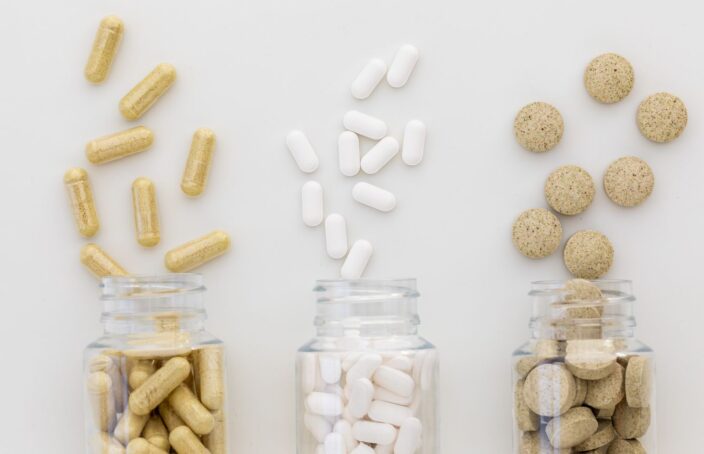Best Digestive Enzymes for Bloating and Gas
Let me tell you a story—one that might sound all too familiar. A couple of years ago, I found myself lying on the couch, clutching my stomach after yet another meal that felt like it had turned into a balloon in my gut. The bloating wasn’t just uncomfortable—it was exhausting. It made me dread eating, turning every meal into a gamble of whether I’d feel fine or spend hours puffed up like a beach ball.
After countless doctor visits and trial-and-error remedies, I stumbled upon digestive enzymes. At first, I was skeptical—how could these tiny capsules help where so many other things had failed? But over time, they didn’t just alleviate my bloating; they transformed my relationship with food and digestion.
Today, I’ll share everything I’ve learned about the best digestive enzymes for bloating and gas. Whether your belly’s been feeling more like a hot air balloon or a cement mixer, these insights could help you find relief.
What Are Digestive Enzymes, and Why Do You Need Them?
Think of your digestive system as a team of chefs preparing a complex meal. Each enzyme is like a specialized sous-chef, assigned to break down fats, proteins, or carbohydrates. When your body doesn’t produce enough of these enzymes—or they’re not working efficiently—your food can sit partially digested, leading to bloating, gas, and discomfort.
Digestive enzymes come in three main types:
- Proteases break down proteins into amino acids.
- Lipases tackle fats, converting them into fatty acids.
- Amylases handle carbohydrates, turning them into sugars for energy.
When your body’s “kitchen staff” isn’t performing well, introducing supplemental digestive enzymes can fill in the gaps, ensuring your meals are broken down efficiently and comfortably.
1. Papain and Bromelain: The Tropical Powerhouses
Papain (from papaya) and bromelain (from pineapple) are nature’s gifts to digestion. These enzymes are particularly effective at breaking down proteins, making them a go-to for people struggling with heavy, protein-rich meals.
Why It Works:
Papain and bromelain act like microscopic scissors, snipping protein chains into digestible bits. This not only prevents bloating but also reduces the gas that often accompanies poorly digested protein.
Personal Experience:
After a steak dinner that once would’ve left me feeling like I’d swallowed a brick, I tried a supplement containing papain and bromelain. The difference was night and day. Instead of discomfort, I felt light and satisfied—like my digestive system had finally caught a break.
Best for: Heavy protein meals and post-holiday feasts.
2. Lactase: A Lifesaver for Dairy Lovers
If cheese boards and ice cream sundaes leave you bloated and gassy, lactase might be the enzyme you need. Lactase breaks down lactose, the sugar in dairy products, which many people struggle to digest, especially as they age.
Why It Works:
Lactose intolerance happens when your body doesn’t produce enough lactase. Supplemental lactase gives your digestive system the boost it needs to handle dairy without the unwanted side effects.
Personal Experience:
My wife loves her morning cappuccinos, but they didn’t always love her back. After adding a lactase enzyme to her routine, her post-coffee bloating disappeared, and she could enjoy her mornings without hesitation.
Best for: Dairy intolerance and indulging in creamy treats.
3. Alpha-Galactosidase: The Bean Whisperer
Legumes, cruciferous vegetables (like broccoli and cauliflower), and beans are notorious for causing gas. Alpha-galactosidase is the enzyme that can tame these gassy culprits.
Why It Works:
This enzyme breaks down complex carbohydrates into simpler sugars, preventing the fermentation process that produces gas in your intestines.
Personal Experience:
Before discovering alpha-galactosidase, chili night at our house was a gamble. One capsule before a bean-heavy meal, and it was like magic—no more bloating, no more awkward moments.
Best for: Bean-based dishes, vegetable-heavy meals, and avoiding post-meal embarrassment.
4. Amylase: Tackling Starchy Foods
Do you love bread, pasta, and potatoes but hate the bloating they bring? Amylase is the enzyme that helps break down starches into sugars your body can use for energy.
Why It Works:
When starches aren’t fully digested, they can ferment in your gut, leading to bloating and gas. Amylase ensures they’re processed efficiently, so you feel energized instead of sluggish.
Personal Experience:
For years, I avoided pasta nights because of the inevitable discomfort. Adding an amylase supplement allowed me to enjoy a plate of spaghetti without feeling like I was carrying a food baby.
Best for: Carb-heavy meals and indulging in comfort foods.
5. Lipase: Fat’s Best Friend
If greasy or rich foods leave you feeling queasy or bloated, lipase could be the enzyme you’re missing. Lipase breaks down fats into fatty acids and glycerol, making them easier to absorb.
Why It Works:
Without enough lipase, fats can linger in your stomach, causing discomfort and bloating. Supplemental lipase helps move things along smoothly.
Personal Experience:
I used to dread family pizza nights because of the post-meal heaviness. After introducing a lipase enzyme, I could enjoy a slice (or two) without feeling weighed down.
Best for: Fatty foods and rich, indulgent meals.
6. Betaine HCl: Supporting Stomach Acid Levels
Sometimes bloating isn’t just about missing enzymes—it’s about low stomach acid. Betaine HCl works by increasing stomach acid levels, creating an optimal environment for enzymes to do their job.
Why It Works:
Your stomach acid is like the first line of defense for digestion. When levels are too low, even the best enzymes can’t function properly. Betaine HCl boosts digestion at its core.
Personal Experience:
When I first started using betaine HCl, it felt like my digestive system was waking up after a long nap. Meals that once lingered in my stomach now passed smoothly, leaving me feeling light and energized.
Best for: People with low stomach acid or chronic indigestion.
7. Multi-Enzyme Blends: The All-in-One Solution
If your bloating stems from multiple food types, a multi-enzyme blend might be your best bet. These supplements combine several enzymes (like amylase, protease, and lipase) to tackle a variety of digestive challenges.
Why It Works:
Multi-enzyme blends are like a Swiss Army knife for your gut, providing a comprehensive solution for mixed meals.
Personal Experience:
On busy days, I don’t always have time to analyze my plate. A multi-enzyme blend covers all my bases, allowing me to enjoy meals without overthinking.
Best for: Everyday digestion and mixed-ingredient meals.
How to Choose the Right Digestive Enzyme for You
With so many options, finding the right enzyme can feel overwhelming. Here are some tips to simplify the process:
- Identify Your Triggers: Pay attention to which foods cause bloating and discomfort.
- Start Small: Begin with a single-enzyme supplement to see how your body responds.
- Consult a Professional: A nutritionist or doctor can help tailor recommendations to your specific needs.
- Read Labels: Look for high-quality products with clear ingredient lists.
Tips for Maximizing Digestive Enzymes
Digestive enzymes work best when paired with healthy eating habits. Here are some tips to boost their effectiveness:
- Chew Thoroughly: Digestion starts in your mouth. Chewing well reduces the workload on your enzymes.
- Eat Mindfully: Avoid rushing through meals. Take your time to savor each bite.
- Stay Hydrated: Water aids digestion but avoid drinking too much during meals, as it can dilute stomach acid.
- Combine Wisely: Pair enzyme supplements with the meals they’re designed to help (e.g., lactase with dairy, lipase with fatty foods).
A Digestive Reset
For me, discovering digestive enzymes felt like finding the missing puzzle piece in my journey to better gut health. They didn’t just solve my bloating and gas—they gave me back the joy of eating without fear. My wife and I now keep a small collection of enzymes on hand, tailored to our favorite meals, and it’s made a world of difference.
If bloating and gas have been holding you back, digestive enzymes might be the game-changer you’re looking for. Start small, listen to your body, and enjoy the process of rediscovering food freedom. After all, life’s too short to spend it feeling uncomfortable after meals.


